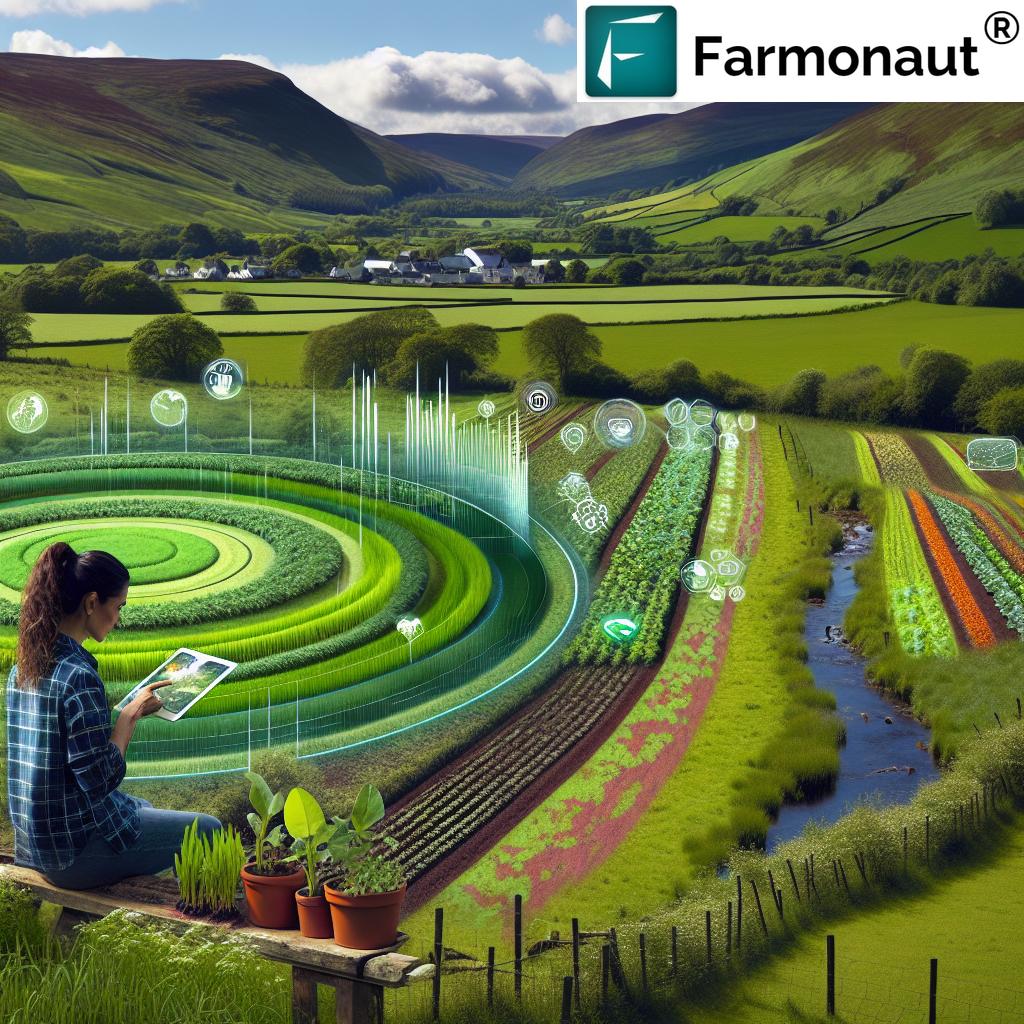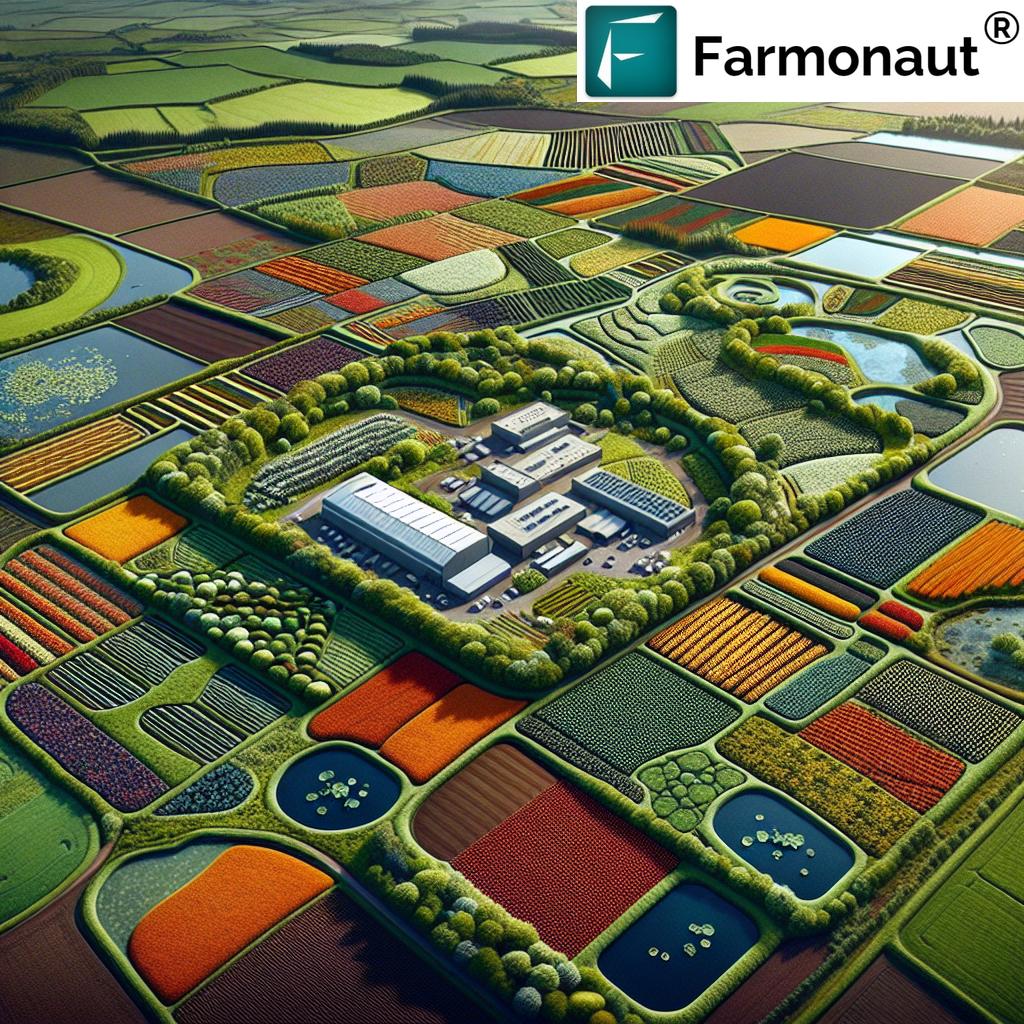Revolutionizing Organic Farming in Scotland: Farmonaut’s Sustainable Agritech Solutions for Soil Health and Food Security
“Organic farming certification processes involve over 20 different standards and inspection criteria for farmers and food businesses.”
In the rolling hills and lush landscapes of Scotland, a quiet revolution is taking place. Organic farming, once considered a niche practice, is now at the forefront of agricultural innovation. As we delve into the world of sustainable agriculture practices and organic farming certification, we’ll explore how cutting-edge agritech solutions, particularly those offered by Farmonaut, are transforming the way we approach soil health management and food security in Scotland.
The Rise of Organic Farming in Scotland
Scotland’s agricultural sector has seen a significant shift towards organic practices in recent years. This transformation is driven by a growing awareness of environmental issues, consumer demand for healthier food options, and the need for sustainable farming methods. As we navigate through this change, it’s crucial to understand the intricate processes involved in organic certification and the role of technology in supporting these endeavors.

Organic Farming Certification: A Comprehensive Overview
Organic farming certification is a rigorous process that ensures adherence to strict standards of production. In Scotland, several certification bodies oversee this process, each with its own set of criteria and inspection procedures. Let’s take a closer look at how these certifications work and what they mean for farmers and consumers alike.
| Certification Body | Scope | Certification Process Duration | Inspection Frequency | Annual Fees (estimated range) | Key Standards/Requirements | Environmental Impact Rating (1-5) | Market Recognition |
|---|---|---|---|---|---|---|---|
| Soil Association | Crops, Livestock, Processing | 6-12 months | Annual | £500 – £2000 | No synthetic pesticides, GMO-free, animal welfare | 5 | High |
| Organic Farmers & Growers | Crops, Livestock | 4-8 months | Annual | £400 – £1500 | Soil health focus, biodiversity promotion | 4 | Medium-High |
| Scottish Organic Producers Association | Crops, Livestock, Aquaculture | 6-10 months | Annual + Spot Checks | £450 – £1800 | Local ecosystem preservation, traceability | 5 | High (in Scotland) |
This table provides a snapshot of the certification landscape in Scotland. Each body has its unique focus, but all share a common goal: to promote sustainable, environmentally friendly farming practices that produce high-quality, organic food.
The Role of Agritech in Organic Farming
As we strive for more sustainable agriculture practices, technology plays an increasingly important role. Agritech solutions, such as those provided by Farmonaut, are revolutionizing how farmers approach organic farming. These tools offer precise data and insights that help farmers make informed decisions about crop management, soil health, and resource allocation.
Farmonaut’s satellite-based farm management solutions provide real-time crop health monitoring, AI-based advisory systems, and resource management tools. These technologies are particularly valuable for organic farmers who need to closely monitor their crops without relying on synthetic inputs.
Soil Health Management: The Foundation of Organic Farming
At the heart of organic farming lies the principle of soil health management. Healthy soil is the foundation of a thriving organic farm, supporting robust plant growth, enhancing biodiversity, and improving water retention. Farmonaut’s technology offers valuable insights into soil moisture levels and overall health, allowing farmers to make data-driven decisions about irrigation and nutrient management.
By leveraging these agritech solutions, Scottish farmers can:
- Monitor soil organic matter content
- Track nutrient cycling in the soil
- Identify areas prone to erosion
- Optimize cover crop strategies
Explore Farmonaut’s advanced agritech solutions:
Regenerative Farming Techniques: Beyond Organic
While organic farming forms the basis of sustainable agriculture, regenerative farming techniques take it a step further. These practices aim not just to maintain but to improve the land’s ecosystem. In Scotland, farmers are increasingly adopting regenerative techniques such as:
- No-till farming
- Crop rotation
- Composting
- Integrated livestock management
Farmonaut’s technology supports these practices by providing detailed analytics on crop health and soil conditions, enabling farmers to fine-tune their regenerative strategies.
Agroforestry: Combining Agriculture and Forestry
Agroforestry is gaining traction in Scotland as a sustainable land management system. This practice integrates trees and shrubs into agricultural landscapes, offering numerous benefits:
- Improved soil structure and fertility
- Enhanced biodiversity
- Carbon sequestration
- Diversified farm income
Farmonaut’s satellite imagery and AI-driven insights can help farmers identify optimal areas for agroforestry implementation and monitor the health of both crops and trees in these integrated systems.
Aquaculture Sustainability: Extending Organic Practices to Water
Scotland’s rich coastal waters provide ample opportunities for sustainable aquaculture. Organic certification in aquaculture covers various species, including:
- Fish
- Bivalves (mussels, oysters)
- Shrimp
Farmonaut’s technology, while primarily focused on land-based agriculture, can be adapted to monitor water quality and environmental conditions crucial for sustainable aquaculture operations.

“Scotland’s organic food industry has grown by more than 30% in the last decade, driven by sustainable agritech solutions.”
The Organic Food Supply Chain: From Farm to Table
The organic food supply chain in Scotland is a complex network involving farmers, processors, distributors, and retailers. Each step of this chain requires careful management to maintain the integrity of organic products. Farmonaut’s blockchain-based traceability solutions offer a powerful tool for ensuring transparency and authenticity throughout the supply chain.
Key components of the organic food supply chain include:
- Organic farms
- Processing facilities
- Storage and transportation
- Wholesale and retail markets
By leveraging Farmonaut’s technology, stakeholders can track products from field to shelf, ensuring compliance with organic standards at every stage.
Organic Textile Production: Extending Sustainability to Clothing
The principles of organic farming extend beyond food production to include textile crops like cotton and flax. In Scotland, there’s a growing interest in organic textile production, which involves:
- Organic cultivation of fiber crops
- Sustainable processing methods
- Eco-friendly dyeing and finishing techniques
Farmonaut’s crop monitoring tools can be invaluable for organic textile producers, helping them maintain the high standards required for organic certification.
Climate Crisis Mitigation: Organic Farming’s Role
Organic farming plays a crucial role in mitigating the climate crisis. By reducing reliance on synthetic inputs and promoting soil health, organic practices contribute to:
- Carbon sequestration
- Reduced greenhouse gas emissions
- Enhanced ecosystem resilience
Farmonaut’s carbon footprinting feature allows farmers to track their emissions and identify areas for improvement, further supporting climate change mitigation efforts.
Protecting Forests and Promoting Biodiversity
Organic farming practices in Scotland extend to forest protection and biodiversity enhancement. Farmers are encouraged to:
- Maintain and plant hedgerows
- Create wildlife corridors
- Preserve existing woodlands
Farmonaut’s satellite imagery can help farmers monitor these areas, ensuring they remain healthy and vibrant habitats for local flora and fauna.
The Financial Aspects of Organic Certification
While the benefits of organic farming are clear, it’s important to consider the financial aspects of certification. Costs typically include:
- Initial application fees
- Annual inspection fees
- Licensing fees
These costs can vary depending on the size and type of operation. However, many farmers find that the premium prices commanded by organic products offset these expenses over time.
Transitioning to Organic: Challenges and Solutions
The transition to organic farming can be challenging, typically requiring a conversion period of 2-3 years. During this time, farmers may face:
- Reduced yields
- Increased weed and pest pressure
- Learning curve for new practices
Farmonaut’s AI-driven advisory system can provide valuable guidance during this transition period, helping farmers navigate these challenges more effectively.
The Future of Organic Farming in Scotland
As we look to the future, the outlook for organic farming in Scotland is bright. With continued technological advancements and growing consumer awareness, we anticipate:
- Increased adoption of organic practices
- Further integration of agritech solutions
- Expansion of organic markets
- Enhanced food security and environmental protection
Farmonaut’s commitment to innovation and sustainability positions it as a key player in this evolving landscape, supporting Scottish farmers as they embrace organic and regenerative practices.
Conclusion
The revolution in organic farming in Scotland, supported by Farmonaut’s sustainable agritech solutions, represents a significant step towards a more sustainable and secure food future. By embracing organic certification, leveraging advanced technologies, and prioritizing soil health and biodiversity, Scottish farmers are not just producing food – they’re nurturing the land for generations to come.
As we continue to face environmental challenges, the importance of organic and regenerative farming practices cannot be overstated. With the support of innovative companies like Farmonaut, Scotland is well-positioned to lead the way in sustainable agriculture, setting an example for the rest of the world to follow.
Explore Farmonaut’s API solutions:
FAQs
- What is organic farming certification?
Organic farming certification is a process that verifies a farm’s adherence to organic production standards, ensuring no synthetic pesticides or fertilizers are used and promoting sustainable practices. - How does Farmonaut support organic farmers?
Farmonaut provides satellite-based crop monitoring, AI-driven advisory systems, and resource management tools that help organic farmers make informed decisions about their crops and land management. - What are the benefits of organic farming for the environment?
Organic farming promotes soil health, enhances biodiversity, reduces pollution, and contributes to climate change mitigation through carbon sequestration and reduced greenhouse gas emissions. - How long does it take to transition to organic farming?
The transition period typically takes 2-3 years, during which farmers must follow organic practices but cannot yet sell their products as certified organic. - Is organic farming more expensive than conventional farming?
While organic farming can have higher initial costs and potentially lower yields, many farmers find that premium prices for organic products and reduced input costs balance out over time.






